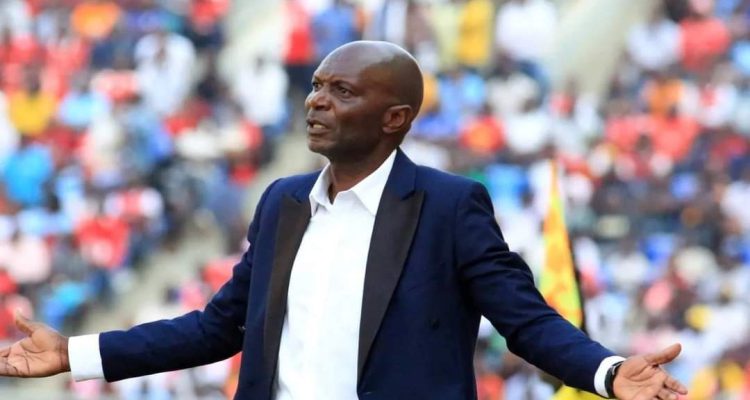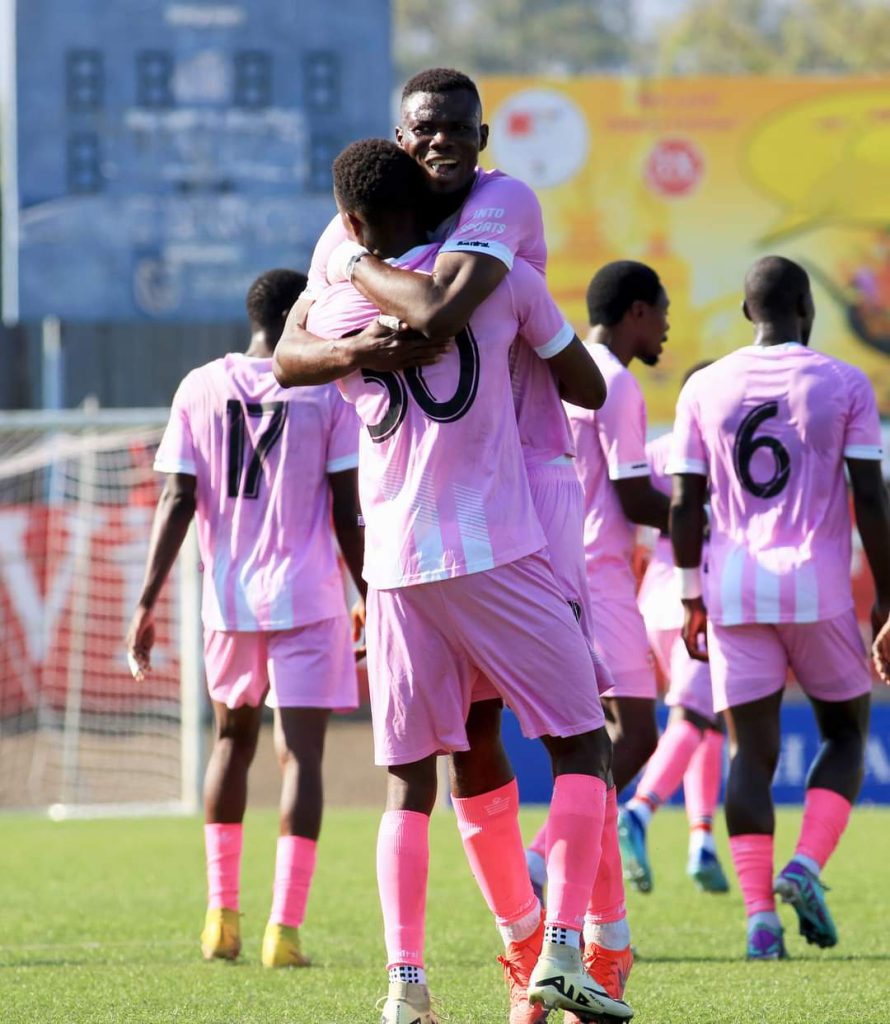
Despite FCB Nyasa Big Bullets’ recent poor run of form in the TNM Super League, the feeling going into Sunday’s Blantyre derby was that Kalisto Pasuwa could get a result yet again, as he had done in three out of his four previous cup meetings against Mighty Mukuru Wanderers.
Led by their robust defensive structure and impeccable counter-attacking play, that’s exactly what happened.
The defending champions played with heart and fervidity and eventually succumbed Wanderers to yet another derby defeat in a knockout competition.

Here is a tactical analysis of Bullets’s 2-1 win over Wanderers in the Round of 16 of the FDH Bank Cup.
SYSTEMS
Both teams set up their usual formations, with Wanderers using a 4-4-2 formation and Bullets in their counter-attacking 4-3-3.
The two team sheets practically picked themselves due to the performances of all players involved, with Clement Nyondo the only slight surprise name on the Wanderers team sheet, keeping out Wisdom Mpinganjira.
As for Kalisto Pasuwa, he used all his defending midfielders by including Frank Willard to play alongside Yankho Singo and Lloyd Aaron.
Willard, who has been out of action since November last year due to an injury, was slightly more inevitably included than might have been perceived due to his ability in some key areas, in addition to his important role in dropping deep during Bullets’s build-up to help bypass Wanderers’s intense pressure.
BULLETS’ PRESS
Pasuwa’s men pressed in a diamond shape, accompanied by their usual formation that would sometimes float into a 3-5-2/4-4-2 depending on how high they were pressing.
The pressing strategy was aggressive and coordinated, completely stunting Wanderers’s ability to progress the ball forwards, particularly in central areas.
Bullets were excellent at maintaining their diamond shape regardless of the positioning of the ball and often shuffled their opposition into switches of play to the other side, which was never effective at truly allowing Wanderers to escape the pressure.
The pressing strategy was aggressive, although more out of an intent to force Wanderers backwards or into bad passes, rather than to win the ball on a tackle.
As soon as Wanderers launched their first offensive move, they found themselves under pressure through a well-calculated counter-hurricane attack that resulted in Bullets’s opening goal in the first minute of the match.
If one Bullets player was dragged outside of the diamond shape, the others would follow to remain compact and coordinated in their shape.
In some moments, this caused an accidental interchange between the positioning of the front four and in these moments, Wanderers had a better time escaping Bullets’s press and playing through thirds.
Unfortunately for the Lali Lubani boys, this was a rarity, and Bullets stuck very well to their individual and collective tasks.
Their press was also exceptional in kick-starting counter-attacks, as Pasuwa has practically become known during his time at the helm of Bullets.
With Bullets’s current form, Pasuwa knew that Wanderers would keep possession and he deliberately allowed them to have the ball while he pounced on them through counterattacks.
BULLETS’ COUNTER ATTACK
One of the primary reasons why Pasuwa has fared so exceptionally well during nearly all of his Blantyre derbies has come down to two things- defensive organization, and a reliance on quick attacking transitions.
Bullets’ opening goal came through a well-calculated counter-attacking move shortly after the Nomads had tested Richard Chimbamba.
From the goal-kick, the People’s Team launched their first offensive move through Aaron who switched the ball to Chikumbutso Salima.
The winger wasted no time in sending a dangerous cross into the box that caught Wanderers defenders off-guard, allowing Babatunde Adepoju to simply tap in the ball.
Although they couldn’t find the back of the net off a counterattack for the rest of the match, nearly all of Bullets’s attacks came from these phases of the game.
With this approach, Bullets proved themselves yet again to be the perfect team to thwart Wanderers’s style. For all their possession and attempts to play break lines, Wanderers could not find a way beyond Bullets’s first-half press and second-half mid-block.
Upon winning the ball, Bullets attacked at speed through quick dribbling and varied runs from players further ahead, expanding the width of the field the higher they progressed.
The likes of Maxwell Phodo, Babatunde, Salima, and Aaron were all effective in causing havoc for Wanderers’s defense, as only Muhammad Kung’unde and Timothy Silwimba looked comfortable throughout the game.
Beyond the pace and power of the front-men, Phodo’s exceptional vision and ability to pick out a pass, plus Babatunde’s energy, made it very difficult for Wanderers to adequately cope with Bullets’s transitions.
Silwimba was perhaps the most effective in quickly stopping these attacks from accumulating momentum, but Phodo would often overcome that initial pressure by switching play to the speedy Salima.
This allowed Bullets to roam relatively freely down the right for large spells of the game where they were able to create a few half-decent chances and eventually score their second goal of the game.
These two methodologies of keen defensive organization and counter-attacking are exactly what has troubled Wanderers against many opposition sides in the past few years, particularly Moyale Barracks, Silver Strikers, and Mzuzu City Hammers this season.
The aforementioned teams play exceptionally on the break and for all someone like Stanley Sanudi or Silwimba does in transition, the best teams will find ways to exploit gaps behind players like Felix Zulu or in between the back four of Kung’unde.
That’s exactly what Bullets did, and it was one of the primary reasons why the Lali Lubani boys could never get a proper foothold in the game.
WANDERERS’ FAILURE TO BREAK BULLETS DOWN
As illustrated by the previous two sections, Wanderers struggled to break Bullets down. That part is evident. They relied far too heavily on attacks down the right with the likes of Gaddie Chirwa, Isaac Kaliyati, and Sama (when he came in for Christopher Kumwembe just before the half-time whistle).
Meanwhile, most of their build-up relied on Chirwa and Kaliyati finding ways to break Bullets’s press, with Nyondo hardly involved until he was hauled off for Mpinganjira.
Easily chatting Wanderers’s left-side reliance, Gomezgani Chirwa and Aaron never looked bothered and were two of Bullets’ most resilient performers.
The positioning of players in their press and the individual quality of the likes of Chirwa and Aaron to win the ball meant that Wanderers had to switch to the right, or lose the ball and start again.
Bullets couldn’t ever keep hold of it for long enough to make too much of a difference, but this became very frustrating for the white and blue side who couldn’t turn up the heat enough to allow their individual quality to shine through.
Instead, it was Bullets’s collective quality that won the day, and some Wanderers’s best performers this season ended up having absolute stinkers.
Gaddie Chirwa, Kaliyati, and Mpinganjira in particular never got going and were bullied around by the likes of Nickson Nyasulu and Gomezgani Chirwa.
Blessings Singini also couldn’t find any rhythm down the middle of the field, causing Sama to come much too deep for his pre-planned role, and the former Hammers midfielder to drift to the left and leave the other two isolated for switches of play that never helped.
In the end, Bullets’s defensive resilience gave Pasuwa yet another win in a Blantyre derby, with Meck Mwase, left scratching his head.














